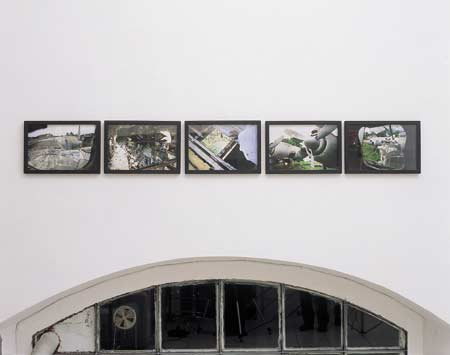![]()
2 |
|
michele dantini


 The Biafra cargo, 2003
The Biafra cargo, 2003
video projection
colour print photos
25 x 28 cm
The Biafra Cargo, 2003
proiezione video,
stampa fotografico a colori
cm. 25 x 28
proiezione DVD

![]()
Michele Dantini is an art critic, photographer (he studied with Michael Yamashita), video maker, and author of travel diaries. Some of his most recent exhibitions have been: 2001 Children’s Art Museum, in the Palazzo Pubblico, Magazzini del Sale, Siena, where he presented images of icebergs alongside interviews held with arctic ecologists and marine biologists. In 2002 Strange Stories was at Palazzo Strozzi and Villa la Loggia, Florence, and consisted of audio and video installations with images of the largest African cities, colonial buildings and ethnographic studies from local museums.
Five (un) ambiguous statements upon distance and beauty, at the Galleria Alessandro De March, Milan, was a sort of marriage between fine arts and socio-ecological reporting. An experiment on the theme of “travelling the neighbourhood”, a theory of the anthropologist Marc Augè, it consists of a survey of a landscape nearby us resulting in a series of botanical photographs. A change of scale reproduces the subjects magnified, surprising and forcing us to observe more attentively the common flowers that we do not notice in normal everyday life.
Between Dresden and Prague was held in the same year and for this exhibition Dantini proposed a joint project aimed at documenting the growth of plants using both drawings and photographs. When the artist was not available, friends or relatives took over the close observation of the plant's evolutionary process. “The project brought together a range of different people”, writes Dantini, “linked by the single requirement that they were available and effectively present on the spot. No particular abilities were required, instead the most important factor was the close relationship of friends, relatives and strong affections.”
In 2003, for the exhibition Working at the Stazione Leopolda in Florence, he designed a public area (GeaLab) for the future Centre for Contemporary Art in Florence, and also participated in Weeds at the 10th International Biennial of Photography at the Fondazione Italiana di Fotografia, Turin. In 2001 he published Diario nambiniano, reprinted in 2003, a study of the politics and institutions of South Africa. The book was short-listed in 2002 for the Paolo Biocca Prize, organised by the Italo Calvino Foundation and the journal L'Indice.
Dantini's projects are based, on the one hand, on the themes of mobility, social and political geography, and on the other, the mental processes that underlie the activities of exploration and observation. Often conceived during his travels in isolated and distant places, the videos, photographs, and writings explore the polarity that exists between research in the field and the aesthetics of fine arts.
Fragments of stories aim to explain a cultural difference, to reveal some complexity (ecological, cultural, social) often ignored by the western media, in order to stimulate attitudes that are not hegemonic. At the same time the non-narrative and non-documentary techniques produce purely sensorial reactions in the observer, encouraging first-hand involvement with the emotions of loss, surprise, contemplation, wonder.



Michele Dantini è critico d’arte e curatore, fotografo (ha studiato fotografia con Michael Yamashita), videomaker, autore di diari di viaggi. Tra le mostre più recenti: 2001 Children’s Art Museum, Palazzo Pubblico, Magazzini del Sale, Siena, presentando immagini di icerbergs insieme ad interviste con Artic, ecologisti, e biologi marini. Nel 2002 Strange stories, Palazzo Strozzi e Villa la Loggia, Firenze, audio e video installazioni con immagini delle più grandi città africane, costruzioni coloniali e studi etnonografici provenienti dai musei locali.
Five (un) ambiguos statements upon distance and beauty, Galleria Alessandro De March, Milano, una sorta di connubio tra fine arts e reportage socio-ecologico. Un esperimento sul tema del “viaggiare nelle vicinanze”, teorizzato dall’antropologo Marc Augè, quindi una indagine su di un paesaggio a noi vicino, da qui fotografie botaniche, attraverso un cambiamento di scala i soggetti diventano di grandi dimensioni, ci sorprendono e ci fanno osservare, con maggior attenzione i fiori comuni, che normalmente, nel quotidiano ignoriamo.
Nel 2003 la mostra Working, presso la Stazione Leopolda, in Firenze, dove ha immaginato uno spazio pubblico (GeaLab), per il futuro Centro di Arte Contemporanea di Firenze; partecipa a Weeds, X Biennale Internazionale di Fotografia, Fondazione Italiana di Fotografia, Torino. Ricordiamo, inoltre, che il suo libro Diario nambiniano, del 2001, ristampato nel 2003, uno studio sulle politiche e le istituzioni del Sud-Africa, è stato nella shortlisted per il premio Paolo Biocca 2002, organizzato dalla società Italo Calvino e dalla rivista L’indice.
I suoi progetti vertono sui temi della mobilità, della geografia politica e sociale da un lato, sui processi mentali implicati nei comportamenti di esploratività e attenzione dall’altro. Spesso concepiti in occasione di viaggi in luoghi dislocati e relativamente remoti, video, fotografie, text-works esplorano le polarità esistenti tra la ricerca sul campo e estetiche fine arts.
Frammenti di story-telling mirano ad articolare una differenza culturale, a mostrare una complessità (ecologica, sociale, culturale), spesso trascurata dai media occidentali, a stimolare atteggiamenti non egemonici. Scelte antinarrative e antidocumentarie sollecitano al tempo stesso risposte puramente sensoriali nello spettatore e lo conducono a confrontarsi in prima persona con esperienze di smarrimento, sorpresa, riflessività, stupore.
